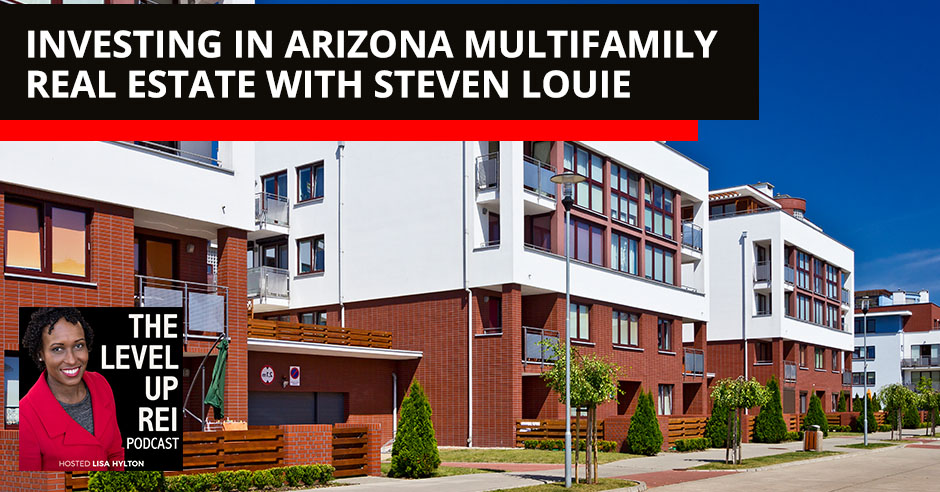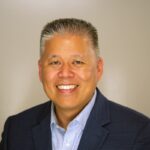
Pivoting from corporate America to multifamily real estate is challenging. Lisa Hylton is joined by Steven Louie, a Managing Partner at Vertical Street Ventures. Steven shares how real estate is about networking and relationships. Investing takes a lot of work, but surrounding yourself with solid partnerships will bring you to financial freedom. People that are slightly different than you are great to partner with. You also need mentors to hold you accountable. Join the conversation to learn more.
—
Watch the episode here
Listen to the podcast here
Investing In Arizona Multifamily Real Estate With Steven Louie
I am back with Steven Louie. He is a Managing Partner and Founder at Vertical Street Ventures where he’s responsible for acquisitions, sourcing capital, and building strategic partnerships. He focuses time on revenue-generating activities for the firm through multifamily real estate acquisitions. They have grown their multifamily portfolio to over 2,500 units across four states, Arizona, California, Florida, and Texas, and has a keen focus on acquisitions and building key partner relationships across the market. I’m super excited to have you on to share your story. Welcome to the show, Steven.
Thanks for having me, Lisa. I’m excited to be on it.
Let’s get started. How did you get started investing in real estate?
Let me take you back a little bit about my corporate life and then how it morphed into investing in real estate. It’ll help your readers understand a little bit about my journey. I’ve been a Corporate America individual all my life, W-2. That’s all I knew. My parents never invested in real estate either. I went to school, got a Finance degree, got a good job out of school as an underwriter for an insurance company. I underwrote on the insurance side and then realized that I can’t sit still too much. I was fortunate enough that I got moved into a sales or business development role. That sales role gave me a lot of the skillsets to be successful, to balance out my technical side as well as my sales side.
I was a very successful sales rep at MetLife. It was all on the institutional business side where we sold employee benefits to large employer groups, 3,000 lives and above. You had at some point have to make a career decision. Do you want to stay as a sales rep or do you want to go into leadership? I got pushed into leadership, which I finished off the rest of my career. Finance, sales, and leadership were my corporate job. What happened halfway through my career, my financial planner and CPA mentioned to me, “Potentially, there are some great benefits for investing in real estate from a tax perspective that you may or may not be able to take advantage of.”
At that point, I looked into it and started investing in single-family homes. I built a pretty good portfolio of single-family homes, which then several years ago, led to a conference on multifamily. Once I found out that you can, I don’t know if it’s create or force appreciation within the multifamily arena, it changed my mindset and to get to what you described about VSV, Vertical Street Ventures, where we are now. The turning point to answer your question was the CPA or financial planner gave me some advice to take the next step and can go into real estate. From there, I transitioned years ago into multifamily.
Take the next step and can go into real estate. Share on XThe transition into multifamily, I know a little bit about your story. I know that you are full-time running Vertical Street Ventures. Was it 2021 or 2020?
1/1 of 2021, when Jenny Gou and myself officially kicked off the company.
Can you talk a little bit about the journey to going full-time? Some of the key things that you had to put in place that were pivotal along that journey.
One of the key things, when I was introduced into multifamily, was actually at a conference. I was doing single-family and I went to a meetup locally in my area. I’m not a meetup guy. I mind my own business and then mind my own portfolio, but I was never a meetup individual. For some reason, something was pulling me to go to a meetup. I went to that meetup and a couple of people there mentioned to me, “There’s this conference coming up in Dallas. You should consider it. It’s all on multifamily.” I said, “Multifamily is completely out of reach. I don’t understand it. I don’t even understand how a commercial loan works, all of those types of things.”
He said, “Why don’t we go?” I signed up to go and he did not go. I went and I listened. At the end of it, I signed up for a mentoring program. That was the instrumental change in my outlook towards multifamily. After signing up for that mentoring and coaching program, I started to invest in limited partnerships or passive investments. I started in passives and then slowly moved in to become a key principal signing on loans. That was all in the Dallas marketplace. Living in Southern California, I found it very challenging from the standpoint of having to go to Dallas, find the property, source it, as well as underwrite it.
I underwrote for about a year in the marketplace and was not able to secure anything outside of a limited partnership or a passive investment. Everything that I learned from a mentorship and a coaching perspective, I took and applied to the Arizona marketplace. That was back in about 2017, 2018, right in that range. All the principles, once you learn them, you can apply them to any marketplace. That’s what we did.

Multifamily Real Estate: You can create or force appreciation by improving the quality of where people live and increasing the rents.
I know you have a mentorship program yourself, which we can talk about as well. Not everyone has the same result. Can you talk a little bit about maybe what are some of the things that you think you passively invest and you were a key principal? What were some of the things that got you over the hump to make that passive investment, to be that key principal on some of those deals, and then ultimately start to lead your own?
There are a few things here. I’ll mention one. The first thing is you have to have the ability to flex your own style. I’ve been blessed that I understand the technical side. I also understand the people side of the business coming from a business development side. There are two parts to that equation. In this business, I’ve seen a lot of technical individuals be somewhat successful in it, but I’ve also seen a lot of technical individuals that maybe, I call it analysis paralysis. What happens is when you tend to be technical, you’ll analyze and want everything to be 100% correct. As we all know, pro formas are not 100%.
You and I could do a pro forma. We’re probably going to be pretty close at the end of the day once we underwrite it. In reality, if you’re off by 2% or different from 2% from me. It’s still going to be 2% difference because of maybe a philosophy or the art that you put into it. One of the things too, you can’t let that, call it 2%, prevent you from taking action. That’s one of the things that I’ve seen a lot of people not be able to do. A lot of individuals say time is an issue as well. I was working more than a full-time job, but I allocated every single Monday. Our group got together from 9:00 until 1:00 in the morning. We underwrote and did deals. We each had certain responsibilities.
Some of the findings that I found is building a team of individuals to help you. In single-family I always say, you can do it on your own. That’s the reason they call it single. Multifamily, you need multiple different people. That’s why they call it multifamily. As you connect and meet different people, I found people who are slightly different than me are great to partner with. If we’re all technical and we’re trying to do it together, we’re all going to have almost that similar mindset. It’s good to have complementary skillsets across the board to help the team potentially grow.
As you left off with your story, you got to Arizona and you brought there the principles that you learned to then start buying in this market. When you started buying in this market was 2017, 2018, it’s now 2022, can you talk about your journey in investing? Which of the cities, Tucson versus Phoenix? Can you talk a little bit about the journey of investing in the market?
Several years ago was a lot different than it is now. The great thing about investing is you do have to pick the appropriate market. I always try to pick the markets that are landlord-friendly. As opposed to where I lived in California, it’s more tenant-friendly. The great thing about a state like Arizona and Texas, they both have favorable rules and laws that help favor the landlord. That’s the criteria that I picked when I was doing single-family homes, as well as multifamily. One of the really great things that I like about Arizona, there are no perils. When I say perils, there are no hurricanes, tidal waves, and earthquakes.
People that are slightly different than you are great to partner with. Share on XWhat that does is it tends to keep the insurance costs pretty predictable year over year. As we know, in some of the other states, you’ll have earthquakes. Where I live, hurricanes and tornadoes are going on right now, as we speak. In parts of Texas, freeze storms and rainstorms. For the most part, let’s knock on wood, the insurance costs have been pretty stable. You can predict them extremely well. The other thing also is from a property tax perspective, we know it. We can predict it will not go up no more than 5%. That’s part of knowing that. When you’re building your pro forma, that can take off. Those were the initial steps of, “This is a good market. There is some potential from an upside perspective.”
The other thing I talked about is where you can create or force appreciation by improving the quality of where people live and increasing those rents. That’s something that we take pride in. We want to build probably a little bit nicer community that people are living in. What we do is we look for assets that maybe are in the C plus B minus area. It could be in an A area, but maybe a B minus asset, where we have the opportunity to build a better place for them to stay, put in a stainless steel package, maybe granite or quartz countertops, undermount sinks, and washers and dryers. We saw washers and dryers huge during the COVID period where the opportunity for people to not want to use the laundry room, to be building them inside the actual suites or units was beneficial.
When I started, I came into the market, but I had a year of experience working with a different broker. What I did is I took two weeks off from my corporate job, my W-2 job, and I went into the market. I met with every single broker that was out there, every single property manager during that first week, and every single attorney. All the people that I potentially could meet with, to have a discussion with them about what my background was, and where we wanted to go. While we were there, they gave me an opportunity and said, “We have this opportunity. This might be a great one for you guys to take on one of the largest brokers there.” I looked at it. Now we have a bunch of hard money there.
They even said, “Go and put the offer in and tie up the deal, then you can do your due diligence with no earnest money at all.” We did that. Sure enough, that was one of the best assets that I have. I’m happy to describe that asset as well. That was my introduction to the Phoenix marketplace. That was a 28-unit. I ended up doing that as a joint venture with a couple of different people. We did so well on that, about halfway through the rehab and the capital expenditures, the broker gave us another deal that was off-market. That led to a third deal, which we preempted. It’s those steps in a market that I described. It was favorable towards landlords is how we work that, but a lot of it has to do with the foundation and the education from that perspective.
Talking about that, you’ve been in this market for several years. A couple of things. When I introduced you, I also mentioned a few other markets, California, Florida, and Texas. Were those markets that you played in as a passive investor or as an active investor?
Florida is more of a passive investment. From a target market perspective, a great target market. In California, I do have some property and a duplex left, but most of the property has been exited from that perspective. The Arizona marketplace is where we’re doubling down on and focused.

Multifamily Real Estate: Adjust expectations and criteria as interest rates go up because the price points are competitive.
Wanting to focus on the state of the market. We have a high interest rate environment at the moment. Rates have further increased. As you think about purchasing more assets, how does that now impact some of the things that you’re looking at and the types of deals that you’re going into?
Interest rates are on everybody’s mind right now. If we had to fast forward by the end of the year, they are going to be even higher. We both don’t have crystal balls, but I think that that’s where it’s going to go. As we’re doing syndications, we do have to be cognizant that it is investor dollars. The good thing is real estate is hedged by inflation. As things are going up, so is rent as well. There is some security in knowing that can still take place, but at the same time, it’s adjusting some of our expectations and criteria. As interest rates go up the returns profile because the price points are competitive.
The returns for investors go down a little bit. What we do is we still put what we call an 8% preferred in some of our opportunities. The passive investor will always get the 8% before any of the general partners get paid. If they don’t get it that particular year, it will accrue and roll to the next year or the next year potentially. The good thing about the market is it’s been double-digit from a rent increase perspective. That’s been favorable, especially with the conservative 3%, 4% increases that we project each year from a pro forma perspective.
We’re still hedged in that to make some adjustments. Expectations for investors also, we have to manage those as well. We do have to be cognizant of that. Especially with the bridge loans now, too. Everybody in the past, you could get an 80% loan to cost Freddie or agency loan, as we know. Now there’s much more volatility in these bridge loans. The execution of your business plan as quickly as possible to ensure the velocity of the dollars backhands to the investors.
One thing that I have noticed is that a few of the deals now, the loan to value or even loan to cost is now a little bit lower. People are treading conservatively as they seek to buy more assets, which also adds to impacting the returns because you have more of your money going into paying that and stuff like that. One other thing to note that I want to touch on here is about the team. You talked about the team, the group of people that you used to underwrite with in the mornings consistently, and then eventually building Vertical Street.
I know it’s not just you. Can you talk a little bit, about your background, finance sales, and leadership? Correct me if I’m wrong, but I always tell people that your W-2 jobs, you can use to help groom you for the next chapter. I would feel that the leadership opportunities that you saw in the W-2 and corporate environment probably impacted the way you were then able to now build the business that you’re building now.
No matter your job, do it well, and great things will happen. Share on XI’m also a believer in mentors too. I’ve had a great mentor throughout my corporate career. I’ve always been a high performer. They’ve always given me mentors. One of the mentors mentioned to me, “No matter what it is, do your job well and great things will happen.” I’m a very positive person. Many negative things could pull us down, high interest rates, whatever they are. That was the focus. Getting into leadership was substantial. For anybody that’s out there, there can be challenges and difficulties with any type of position, but take the best out of that.
When I was an underwriter, I took the technical side. I wanted to understand that the best I could. It’s translatable skills that I can use over here in this environment. Business development is key. Everything we do now is working with brokers and property managers. A lot of that, it doesn’t matter where that number comes. Like the example I use, the delta between your pro forma and my pro forma is probably going to be close. Now the rest of it is the art.
Sales and business development are crucial relative to building relationships. Those relationships are key. One of the key things that I try to drive a team about is building the right relationships with people. That goes with investors as well. The key thing is building strong relationships, whether it’s an investor or your team. Relative to your question about building the team, that’s what I’ve been good about, bringing the right team members together to get to that end goal.
We can all get from point A to point B. Most of us want to do it in a straight arrow. Typically, it’s not. It’s going up and down, but at the end of the day, we’re going to get to that point B. In terms of bringing the teams together, I would say Vertical Street Ventures, I was fortunate enough to meet Ronnie Gou at a meetup. Again, a great place to have a meetup. He asked me a little bit about multifamily. He wasn’t too versed in it. At that point, he might’ve read a book and then he said, “I want to introduce you to my wife.” His wife is tremendous in terms of her ability to synthesize, take a concept, and make sure that it’s operational and we can execute on that. Her name is Jenny.
The complementary skillsets that Jenny and I both have helped us take this to the next level in a short period of time. Both of us had super strong corporate careers. Both of us were in a business development type role, but we’re also technical. Both of us could flex and do each other’s job and do it fairly well, but we learned to stay in our lanes. The great thing is Jenny has built roles for everybody. My role is focusing on sourcing capital and working with Kyle and some of the acquisitions. Her role is focused on helping to execute all the things that we have to do. The most important thing is how well it’s managed. She’s in charge of the asset management, the operations, the dean of our academy.
All of those things she’s super strong at. Her husband, Ronnie, left Corporate America too after several years at P&G. He is super strong on the sales side. He and I work closely together on some of the lists and we parse it appropriately. As you know, we brought in Kyle who’s boots on the ground in the Arizona marketplace. He lives in Scottsdale now. He can be there on a moment’s notice where I used to have to fly in, rounding the team out from that perspective. We also brought in two finance individuals because the properties need people to actually take care of the finance side. We also brought in somebody to oversee the asset management closely with Jenny, an asset manager.

Multifamily Real Estate: As a passive investor, you do have to educate yourself first.
Lastly, a construction lead. Rolling out benefits, that’s what I used to do in my old company. Now, the ability to roll out benefits to all of our team and culture is important too, as I’ve been in employee benefits in an HR consulting. It goes hand in hand. We have a lot of great people on our team. It’s not just one person that makes it. It’s all of us together to get to that next stage. That’s why you’ve seen this substantial growth that we’ve had in short order from an acquisition standpoint, as well as a people standpoint.
From there, I want to touch on a couple of different things. The first is coming right off of that, around this time here, I’ve also released an episode about earning while you learned. I meet a lot of people daily who are seeking to get into investing in apartments actively, but they want to do so in a way that they’re seeking to escape their job to be free. Deciding to build a business is not being free. It’s a lot of work. You actually could be working more than working in a corporate job, but I might be wrong. Could you share what your insights are on that? I know there might be some people reading who might feel that way.
The great thing is I’ve spent a lot of time connecting with lots of other entrepreneurs like yourself and everybody that’s in this ecosystem, where we’re basically entrepreneurs that did something prior to getting into multifamily. In terms of the amount of effort upfront, there is a lot of effort. You have to be disciplined and get up every morning. That’s the one thing that Corporate America taught me. I had to commute for two hours to my work. I got in early by 6:00 and I stayed until 8:00. It was almost ingrained in me because of what I had to do in my DNA to work the way that I do. Somebody will think, “This is going to be easy. Real estate is easy.” It isn’t.
You have to know the right people. It’s all about networking and relationships. There are many components to it. That’s why you have to think about building a solid team or having some solid partners around you in order to reap that success. I got off the phone as a matter of fact, with somebody who was working a corporate job. They moved and did exactly what we’re doing. They said, “Steve, it was hard.” They moved back. Now they’re back in lending and that’s what they do. They said, “That was easier for me, but now I can understand what you’re going through, and now I can help you from a lending perspective.” You do actually put in more hours, but you can put the hours in on your time.
That’s the beauty of it. Right now, I can do this podcast anytime I want. It could be late in the afternoon or in the morning. We have some control over our schedule from that perspective. That’s what I like about it. Am I working probably just as hard? I would say now that I have a team of folks, we’ve actually allocated a lot of the roles across the board, but we all are working extremely hard. Arguably probably as hard as I was when I was a W-2. Eventually, as you see some of the rewards of things going full cycle, you can see the benefits of owning your own business and this type of work in terms of multifamily real estate.
It’s a farmer’s perspective because you’re planting seeds and you’re not going to eat the harvest tomorrow. You talked about moving into this market in 2017 and getting to where you are now. It’s farmer mentality 100% of continuing to show up for those seeds and nurture them. Take care of the apartments and build the relationships in that market to get to a place where you then get more deal flow and go from there. Before we talk about your conference that you have coming up, I want to talk a little bit about advice you would give to passive investors. People who are thinking about deploying capital into real estate projects here in 2022, might be a little bit hesitant. What are some of the things that you would tell them as they are thinking about deploying capital in 2022?
Real estate is about networking and relationships; surround yourself with a solid team to reap success. Share on XThe first thing is as a passive investor, you do have to educate yourself first. That’s the key thing. All of us syndicators out there are saying very much the same thing. We all have similar, “This is going to be a two multiple 15% IRR with 5% to 7% cash-on-cash return.” If I’m a passive that’s out there, I’d say do some due diligence on each of your potential syndicators or the lead general partners that are out there. Don’t be afraid to make some phone calls. Ask them the tough questions to where have you had some challenges and how did you guys overcome those challenges relative to the group?
How many people are part of your syndication? How long have you been in the market? It’s tough for syndicators as well. It’s tough for all of us as we were trying to grow our business, but in the past, I did go with a lot of more inexperienced syndicators. I saw where some of the hurdles or pitfalls came about by me signing as a KP with some less experienced individuals. If the less experienced is partnered with an experienced partner or general partner, I would maybe lean into that. If they were all inexperienced general partners, I would always ask a lot of questions. I myself would not invest in that again, knowing the experience that I had. For those that are aspiring, GPs, our General Partners that are out there, I’d say partner with somebody who’s done it in the past. As Tony Robbins always says, “Success leaves clues.” Why don’t you follow some of those clues? That’s probably the strongest thing there.
It’s important. I highly recommend it. To finish this up, you guys have your first conference coming up this 2022, June 4th through 5th in Scottsdale. Can you talk a little bit about the decision to have, first of all, the decision to have a conference? What people can expect?
The first thing was what Jenny and I do at the beginning when we first started our company, we wrote down all of the things that we want to accomplish in the next three years. One of the key things is to write down goals, both short-term and long-term. If you write them down, you have them up on a board here. You visualize them. They will come true. You have to morph from that. One of the key things is we meet every single week and every single week, that’s how we grew. We bring the whole team together quarterly and then we review all of the goals that we set out and see if we have to adjust accordingly.
We put together a whole list of all the things that would be great to have and then we narrowed it down to 3 to 5 things. One of them was to have a conference to give back to the ecosystem that we had that has been good to us. We started working on it and then paralleled and simultaneously said, “We have to put that down there.” We put it down as a date and said, “We’re going to do it.” It’s going to be a great conference where it’s going to be the nuts and bolts of multifamily. You’re going to hear the successes that we’ve had and the hiccups or any of the speed bumps that we came across from Jenny’s perspective, my perspective, and also Kyle’s perspective.
I’m super excited about that. There are going to be some motivational speakers. We have about fifteen properties in the Arizona marketplace. We’re going to see all the ones that are in Phoenix. We have some split in Tucson and Phoenix, but the ones in Phoenix we’ll have a bus tour on. Hopefully, there are some vacancies, so we can show you what the unit looks like. If there are some, then we’re going to show you what we did from the beginning to where we did from a rehab perspective. I’m excited about the conference coming up.

Multifamily Real Estate: To execute, you need to have someone who keeps you accountable.
What would you say is the theme of your conference here?
The theme is taking some action. We only have a few tickets left, but the great thing about it, the theme is gaining a sound education and then taking action. A lot of us will be educated. We’ll absorb it all. The key thing out of this is to take action. Whether that’s signing up and being in a mentorship program, taking action and underwriting five deals every single day or every single week, whatever that action is.
One key thing that I notice here is how to become financially free through apartment investing in three years. Let’s talk about that. You want people to come to the conference to get that. Maybe 1 or 2 of the key things that you think are bolsters that are a part of that journey.
That was one of the slogans, financially free in three. The reason we said that is that’s something that I was able to do. I set a goal of five years to get out of Corporate America, way back when I was able to do it in three. What were the steps that I took to do those in three? It does take a lot of effort. These are pretty basic things that I mentioned. One, set goals. We can help you set some of those goals. Set goals on what you want to do, both short-term and long-term.
From there, it’s about execution and how you execute that. To execute, you have to have someone that keeps you accountable. Finding a mentor to actually do that. If you can encapsulate those few things in there, you will be able to either exit your Corporate America job or whatever your goal is. Some people don’t want to exit from Corporate America. They love what they do, and they want to supplement. For me, my goal was to build enough passive income to allow me the freedom to leave Corporate America if I wanted to. I was able to, because of investing in multifamily.
Before I move into my Level Up questions, one last thing to ask you is, as people think about conferences, could you share a little bit about how conferences have benefited you? You’ve talked a little bit about how those meetups have benefited you as well, but how have conferences helped you in your journey in terms of continuing to build and find team members and deals and everything?
If you write down short-term and long-term goals, and visualize them, they will come true. Share on XI was looking at all my lanyards. I had 25 of them. I’ve been to multiple different conferences. I’m a believer in meetups and conferences. They’ve helped me substantially. Sometimes in the beginning I used to stay a little quiet, stay on the sidelines and listen. As I was in a business development role, one of the key things that they always said was, “Nothing bad ever happens when you get in front of your client.” You can put it on any perspective. Nothing will bad will ever happen when you can meet a fellow investor, a fellow general partner. A lot of people say, “Aren’t they all your competitors?” I say the ecosystem is so large that the ability to meet you, Lisa, at BEC was awesome.
The ability to meet many different individuals. You’ll never know who can help you in the long run. Who knew that simple meeting with Ronnie Gou over at the meetup that was close to my house will lead to his wife working closely with us for a whole year prior to us even starting a business? Who knew that Kyle Mitchell, who I’ve worked with for the last several years and went to his first meetup in Long Beach to now, we’re partners and he focuses on acquisition and I focus on trying to raise the capital? It’s the neat things that will come about when you open up yourself. Deep down, I’m an introvert too. I might not seem like one on this, but if you look at some of my Myers-Briggs, all of that’s introvert.
It does take a lot of energy for a lot of introverted people to do that. In reality, once you step outside of that zone, you feel relieved. Everybody is thinking the same thing. When we’re going to the conference, everybody is like, “I’ve learned these five different nuggets.” Every time I go to those conferences, what I try to take out is, “Are there five individuals that potentially I can meet up with afterward?” Have that down, “I want to meet up with these particular people.” You write them down and then you send a note back out to them in the future. That’s how you build your network. It branches off from there. It’s all about building genuine relationships out there at these conferences. At least that’s for me.
The conferences have been a game changer. Going to them, I’ve met many different people. It’s always like, “I’m glad I came,” because you meet people that you’ve probably seen on the screens or somewhere, and then it helps you to put everything into perspective and to move from there. That then leads me to my Level Up questions that I ask all my guests. The first thing is, what are you grateful for in your life right now?
I’m super thankful for the family. I had to sacrifice a lot during my corporate career as I climbed that corporate ladder. A lot of that was focused on me. Now, this is the opportunity to focus on my family. It’s great. I have two girls, both in college. One’s graduating in 2022. I’m blessed with that. Rebecca and I, we’ve been married for many years. We’re blessed that we’re all healthy and we got a good family. That’s where the power of multifamily can now allow me to spend more time with my loved ones.
I also think the power of building a team also is key to that too.

Multifamily Real Estate: A mentor is crucial in helping you grow because they give you different perspectives.
The team is the best because you can’t do it by yourself.
What would you say has attributed to your success and continuous growth?
I’m a naturally motivated individual, super competitive. I know what my lane is. I’m always a positive individual too. Like I always say, if I was 7’0” tall, maybe I could be playing in the NBA, but I’m not. Whatever cards are dealt to you, you make the best out of that. Sometimes some of the cards you move out and you get some new cards. Those new cards, maybe it gives you a full house. The positive thought process that I always have keeps me on to that, in addition to reading books and all those other things, but I try not to let the negative take me down. I try to stay positive on the things that I can control.
What do you now know that you wish you do at the beginning of your journey?
In my initial partnerships with some other people when I did some of the initial key principal arrangements, I probably would have done a little bit more due diligence on that. Everything worked out well. We exited all the properties, but I think do your due diligence on your partners because it is a long-term relationship. It takes about five years potentially, as most of the pro formas are, to exit those. Take the time, understand the partnerships that you’re in, and then that will allow you to thrive in the future because it is a long-term marriage.
Before I let you go, one other thing that I want to touch on is your program. You still have it where you help people to become active, like take down deals and stuff like that. Can you talk about the genesis of why you decided to launch it? You launched it in 2021. How has it continued to grow in terms of even more people seeking to join it and stuff like that?
One of the things that I was blessed from a Corporate America perspective was having a mentor and then me actually having a mentor as well in the multifamily arena, which I still have. The mentor is crucial in helping people grow because they give you different perspectives. Specifically, our program is we do help and guide people and speed up the process. Whatever program is out there, they all are going to be great in helping you speed that process up substantially. Even now, I was on with a couple of students. I’m the lead coach. Jenny’s the dean of the academy. I’m the lead coach. The students call and we’ll go through the deals and we’ll give them guidance on what they need to do.
Some of them aren’t as strong as dealing with the broker relationship. What we’ll do is say, “Let’s pick up the phone and give the broker a call.” A lot of times, it’s not comfortable for people to do. It’s like the hands-on experience, walking people through what needs to happen from the beginning of building the relationship all the way through putting the LOI in, through acquisition. Also, through asset management. One of the key things is people think after you acquire it, you don’t have to do anything else and you wash your hands. The most important piece starts day one after the acquisition. That is the asset management piece where you have to have that relationship. You can’t be too harsh on these property managers as well. They can only do so much. It’s how well you can communicate to get them to put your stuff up in front of all the other ones, because they do have a pretty big block of business.
It was good to have you come on the show and drop so much knowledge and information for people. If people want to learn more about you, where’s the best place they can go to learn more?
You can go right to our website, www.VerticalStreetVentures.com. All of our contact information is on there. There’s an Apple app on there that you can schedule time with any of us. For our conference, it’s VSVCON.com.
If you’re reading this episode, which will be released early May 2022, you definitely will get 10% off if you put in a promo code LISA. You definitely should go if you’re trying to get into real estate investing, like property tours of the different markets here in Arizona. You’re going to meet a lot of great people. It’s a win-win.
Thank you so much, Lisa. This has been great.
Thank you for coming on. I appreciate it, Steven.
Important Links
About Steven Louie
 Steven Louie is a Managing Partner at Vertical Street Ventures, where he is responsible for acquisitions, sourcing capital, and building key strategic partnerships. As the founder of Vertical Street Ventures, he focuses his time on revenue-generating activities for the firm through Multifamily real estate acquisitions. Steven worked his corporate career in the Benefits / Consulting industry where he held various executive and sales leadership roles at Mercer and MetLife. As a Partner at Mercer, Steven was the Southern CA Office Leader for Mercer’s Health, Wealth, and Human Capital Consulting practices.
Steven Louie is a Managing Partner at Vertical Street Ventures, where he is responsible for acquisitions, sourcing capital, and building key strategic partnerships. As the founder of Vertical Street Ventures, he focuses his time on revenue-generating activities for the firm through Multifamily real estate acquisitions. Steven worked his corporate career in the Benefits / Consulting industry where he held various executive and sales leadership roles at Mercer and MetLife. As a Partner at Mercer, Steven was the Southern CA Office Leader for Mercer’s Health, Wealth, and Human Capital Consulting practices.

Recent Comments